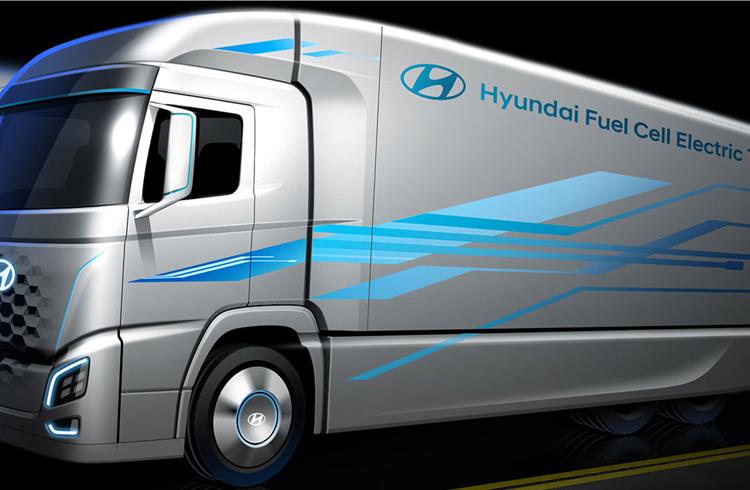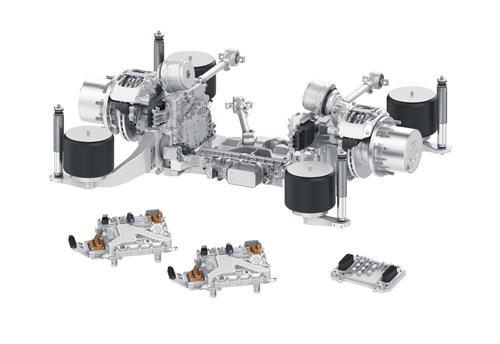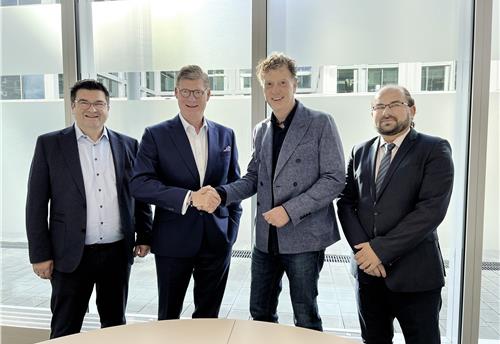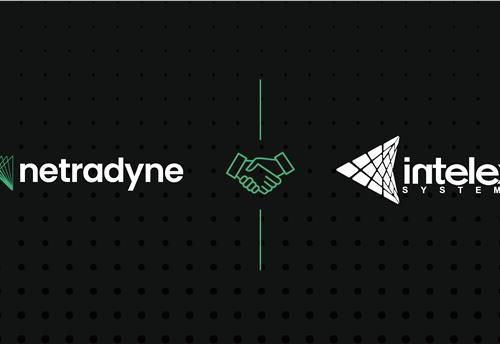Hyundai and H2 Energy to supply 1,000 HD fuel-cell electric trucks to Switzerland
Beginning 2019 through to 2023, the two companies confirm plans to commercialise fuel cell electric trucks.
Hyundai Motor Company today confirmed at the ‘IAA Commercial Vehicles 2018’ in Hanover that it has entered into a Memorandum of Understanding (MOU) with Swiss hydrogen company H2 Energy (H2E).
Beginning in 2019 and over a five-year period Hyundai Motor and H2 Energy will provide 1,000 heavy-duty fuel cell electric trucks and an adequate supply chain for renewable hydrogen. This marks the Korean automaker’s expansion of its FCEV leadership into the eco-friendly commercial vehicle sector. It was in 2013 that Hyundai rolled out the world’s first mass-produced fuel cell electric vehicle, the Tucson Fuel Cell, followed by the release of the world’s leading FCEV, Nexo in 2018.
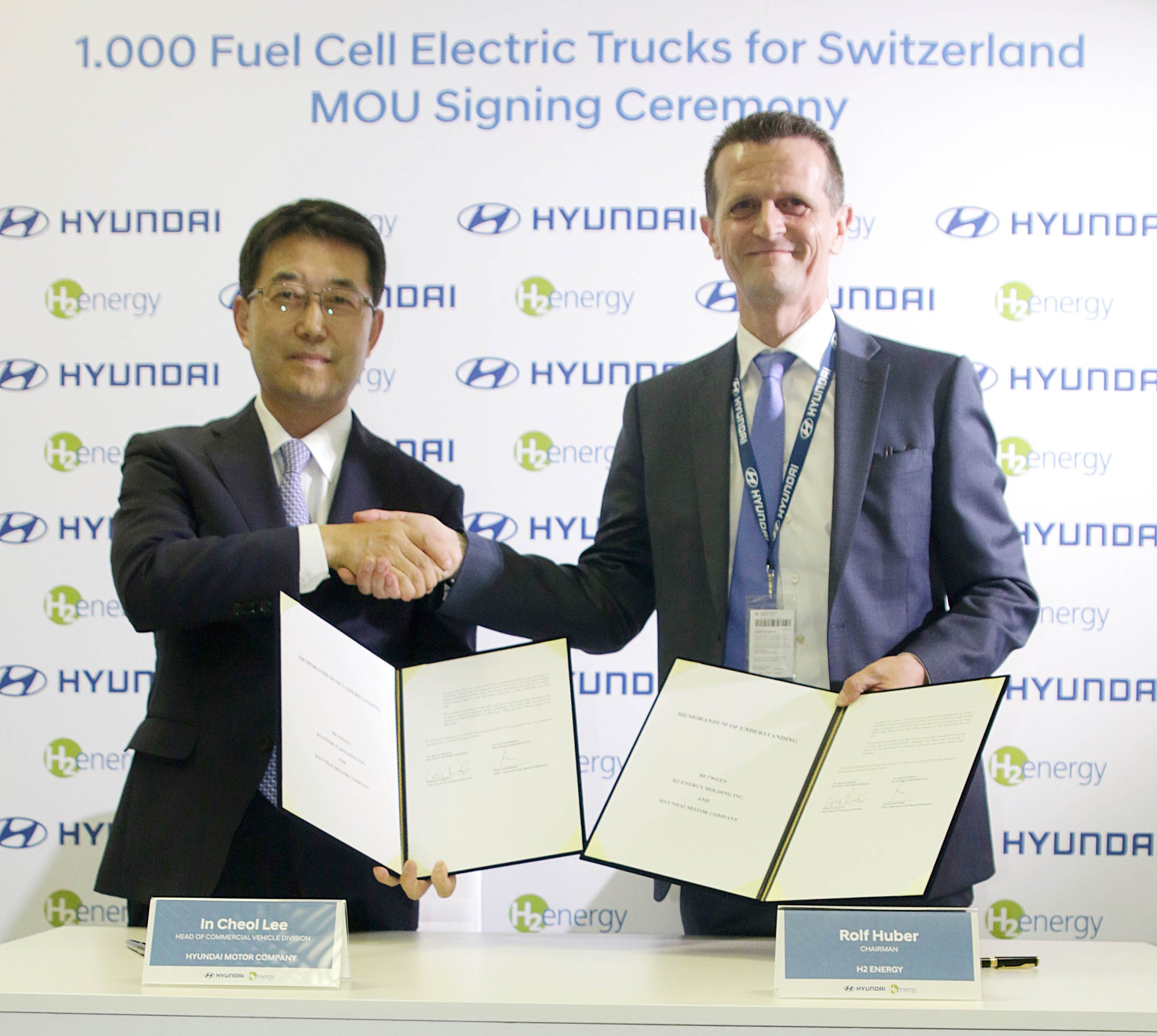
The MOU signing ceremony took place in the IAA Commercial Vehicles 2018 exhibition’s convention center and was attended by key individuals from each company, including Hyundai Motor’s executive vice-president and Head of Commercial Vehicle Division, In Cheol Lee, as well as chairman of H2E, Rolf Huber.
“We are yet again advancing the field of fuel cell technology in the automotive industry with today’s announcement of our ambition to commercialise the fuel cell electric truck for the first time in the world,” said executive vice-president In Cheol Lee. “We will continue to seek opportunities for expanding into other markets by carefully monitoring multiple factors such as fueling infrastructure and governmental policies.”
FCE-truck to European norms
The fuel cell electric truck is being developed according to European regulations. It features a new 190kW hydrogen fuel cell system with two fuel cell systems connected in parallel, also a feature of the Nexo. It is expected to deliver a single-fueling travel range of approximately 400km, and in order to secure sufficient range, eight large hydrogen tanks are being compactly installed, utilizing areas such as between the cabin and the rigid body.
The fuel cell electric truck boasts a distinctive design. It is presented in a simple and clean design which is also aerodynamically efficient, and features a spoiler and side protector.
The front grille symbolises hydrogen through geometric shapes, giving the vehicle a unique and powerful look.
H2 Energy, which specialises in the production and supply of renewable hydrogen in Switzerland, with business subsidiaries in Germany, Norway and Austria, is experienced in the roll out of an optimised hydrogen ecosystem, which focuses on commercial viability for all stakeholders.
H2 Energy plans to make Hyundai’s fuel cell electric trucks available to its Swiss customers starting with the dedicated members of the Swiss H2 Association, which includes several refueling-station operators, retailers and other customers focusing on eco-friendly innovative solutions for logistics and goods distribution.
“A sustainable hydrogen economy needs a designated ecosystem for hydrogen. This is why our collaboration between Hyundai Motor, H2 Energy, the Swiss H2 Association, and Key electricity producers in Switzerland is strategic and makes a lot of sense” said Rolf Huber, Chairman of H2 Energy.
Benefits of fuel cell electric powertrain tech
Fuel cell electric powertrain technology has advantages over battery electric powertrain technology in its applications to larger vehicles such as trucks and buses. Fuel cell technology saves space and reduces weight as well as being more cost efficient to apply as the vehicle size increases. Therefore, the technology is deemed to have a wide array of opportunities to be utilized in the commercial vehicle field.
The global demand for eco-friendly commercial vehicles is expected to increase as eco-friendly government policies are enforced around the world.
To cater to growing opportunities in the sector, Hyundai plans to diversify its fuel cell electric commercial vehicle line-up. Currently under development is the medium sized fuel cell electric truck (Payload: 4~5ton) which can be used in the public services domain such as vehicles used for cleaning.
Hyundai Motor also introduced fuel cell electric express buses during the PyeongChang Olympics in South Korea last February and is currently conducting a pilot operation with fuel cell electric buses in South Korea’s major cities, whilst reviewing plans for mass production by 2020. Domestically, FCEV taxis and car-sharing services are operating on public roads in Ulsan and Gwangju.
Fuel cell electric truck specification (4x2 cargo truck)
|
Specification |
Truck |
|
Gross Vehicle Weight |
18 ton (GCW 34 ton with trailer) |
|
Length |
9,745 mm |
|
Width |
2,550 mm |
|
Height |
3,730 mm |
|
Wheelbase |
5,130 mm |
|
Driving Range |
Approximately 400 km |
|
Hydrogen Refueling Time |
7 min |
|
Tank Capacity / Pressure |
32.86 kgH2 / 350 bar |
|
Fuel Cell Stack Power |
190 kW (2 x 95 kW) |
|
Traction Motor |
350 kW / 3,400 Nm (471PS / 346 kgf–m) |
|
Safety Features |
FCA, LDW ** |
RELATED ARTICLES
ZF to display next-gen e-axle for low-floor city buses at Busworld Turkiye 2024
The AxTrax 2 LF is available with a continuous output of up to 360 kW and a peak torque of up to 37,300 Nm.
Daimler Buses and BMZ Poland to develop next-gen NMC4 electric bus batteries
The new battery generation NMC4 – succeeding the current NMC3 technology – will combine high energy density, resulting i...
Netradyne expands UK operations via partnership with Intelex
The collaboration between Netradyne and Intelex marks a substantial leap forward in advancing road safety and fleet mana...





 By Autocar Pro News Desk
By Autocar Pro News Desk
 20 Sep 2018
20 Sep 2018
 6604 Views
6604 Views



